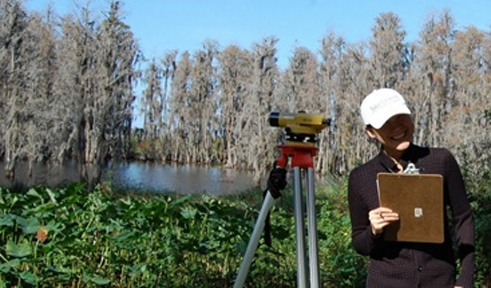Dr. Xizhen “Jenny” Schenk recently joined the faculty of Geological Sciences at Ohio University as an Assistant Professor of Instruction. Schenk’s teaching and research focus on exploring the field of environmental geology, particularly the intersection of climate, water, and human impacts.
“My enthusiasm for geosciences originated from my admiration for the geological wonders of the natural world and from a sense of responsibility to the environment,” Schenk explains. “I am interested in studying hydrological cycles from a climate context. Global warming affects both the frequency and characteristics of atmospheric and oceanic circulation patterns, which modifies both terrestrial temperature and precipitation patterns in North America. For example, the project that I am currently conducting investigates the impacts of climatic variability on the Upper Floridan Aquifer. In this project, I am interested in understanding the connection between atmospheric and oceanic teleconnection variability, such as the mode shifts in El Niño Southern Oscillation and Atlantic Meridional Oscillation, and the variability in aquifer storage using both time and frequency domain approaches.
“My teaching philosophy is rooted in providing an equal and positive learning environment for all students. My interests in teaching come from my own positive experience as a student, and a desire to share my passion for hydrology with the next generation of geoscientists. As a teacher, seeing my students succeed in their careers is my greatest reward. Before I became a teacher, I had opportunities to work with some of the greatest professional geologists in both the private and public sectors of geology. My work experience with Schlumberger, for example, provided me firsthand experience in how to conduct site explorations, interpret geophysical data, characterize the geological formation, and produce technical reports to address private clients’ technical issues. My work experience with the Water Management District allowed me to participate in some of the most challenging freshwater conservation projects, such as the five-year assessment study for the Southern Water Use Caution Area Recovery Strategy. These professional experiences widened my vision and helped me understand how geological sciences operate in the real world and provided me the experience to better prepare my students for their careers in geology.”




















Comments